The great professional services differentiation paradox
6 min read
How to stand out when logic suggests your firm should offer all things to all people whilst not appearing too specialist?
The success of psychics, fortune-tellers, mediums and illusionists relies on their subjects displaying two similar cognitive biases: ‘Subjective validation’ and ‘Confirmation bias’.
Subjective validation is a cognitive bias by which a person will consider a statement or another piece of information to be correct if it has any personal meaning or significance to them.
Confirmation bias is the tendency to search for, interpret, favour and recall information in a way that confirms a pre-existing belief or hypothesis, while giving disproportionately less consideration to alternative possibilities.
Bertram Forer put subjective validation to the test in 1948 in a well-known experiment. He gave his students a personality test and then provided them with a description of their personality supposedly based on the results of their test. Unknown to the participants, each student was given exactly the same personality description.
Forer then asked his students to rate the description’s accuracy on a scale of 0 (very poor) to 5 (excellent). The average score was 4.26 – a very high score if you assume that every student was different. So how did Forer achieve such a high score?
The answer is that the descriptions were vague and general enough that they could apply to a wide audience and positive enough without being unbelievably positive.
So what has this got to do with professional services firms?
In our experience, two types of clients engage professional advisors and consultants.
The first group has a very good idea of what service it is looking for and often understands the problem it is trying to solve. These clients can predict and articulate exactly what advisory work is required and want the problem to be solved efficiently in order to spend less money over a shorter engagement. While this is a low value market, it remains lucrative for firms thanks to the large volumes of work available.
For firms to be successful in this low value market they have to demonstrate to potential clients that they have an abundance of specialist knowledge and the ability to implement a solution efficiently by accessing additional support and expertise as it may arise during the engagement.
The problem for firms targeting this lower value market is that, as Fiona Czerniawska found, “Over time, there’s a danger that specialist firms will find themselves associated with low-cost work in which expertise will be primarily an aid to efficiency.”
The paradox for professional services firms who want to win low value (but high volume) engagements would appear to be:
Demonstrate specialist knowledge and expertise whilst not appearing too specialist for fear of your expertise becoming devalued and your additional support being ignored. At the same time, illustrate how you are different from other firms with whom the client could work.
The second group of advisory clients doesn’t necessarily know what problem it is trying to solve. Fiona Czerniawska has called these types of consulting engagements the ‘unknown unknowns’. These types of engagement are typically of higher value for firms but much harder to acquire.
To be successful in this high value (but lower volume) market, where clients don’t necessarily know what the problem (or solution) is and therefore don’t know exactly what they need, firms are forced to offer a range of different services to be considered.
The paradox for professional services firms who want to win high value (but low volume) engagements would appear to be:
Demonstrate a broad range of services whilst still showing you have the specialist expertise and knowledge to answer the ‘unknown unknowns’ as efficiently as possible once the engagement has begun. At the same time, illustrate how you are different from other firms with whom the client could work.
In short, to win more engagements, it would appear that consulting firms are forced to employ similar tactics to those used by psychics, fortune-tellers, mediums and illusionists by appealing to clients’ subjective validation and confirmation biases:
Be general enough to appeal to as wide an audience as possible whilst not being too specific for fear you will be deselected.
Every cloud has a ‘similar’ lining…
As part of our research for a business development programme, we recently analysed the websites of the largest 10 global consulting firms[1] and it would appear that these firms follow the tactics above.
Almost without exception these firms try to be all things to all people in order to win as much work as possible (we wouldn’t expect anything less). They offer many of the same services and use the same ‘stock phrases’ while all the while trying to convince potential clients ‘why we are different.’ At the same time they refrain from appearing unique or too specialist for fear of being deselected.
To illustrate our findings, we have put the analysed firms’ websites into word clouds. While word clouds are perhaps not a truly scientific method of analysis, they can be a powerful tool to get a snapshot of the main issues and considerations.
Top 10 Global Consulting Firms Word Clouds
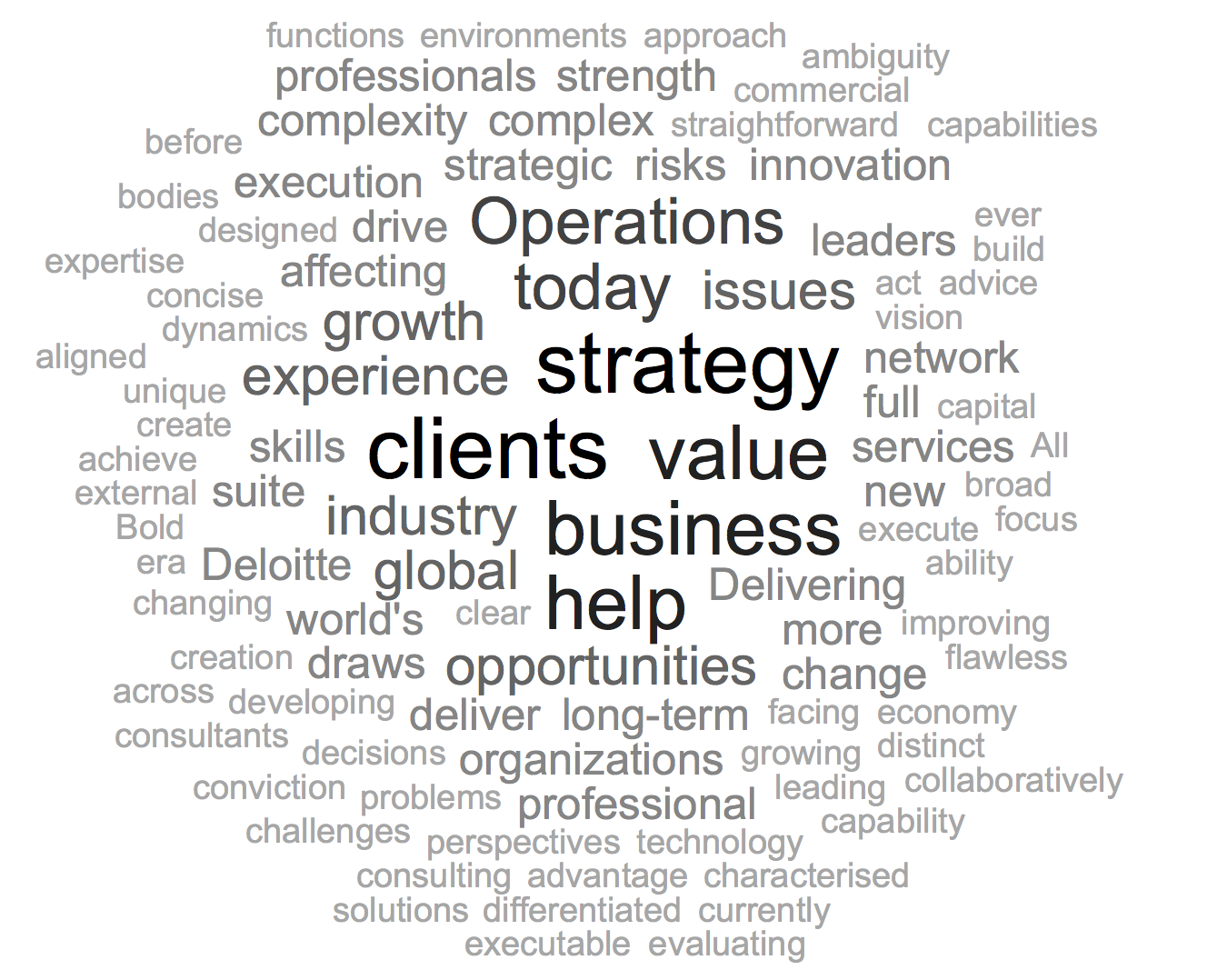
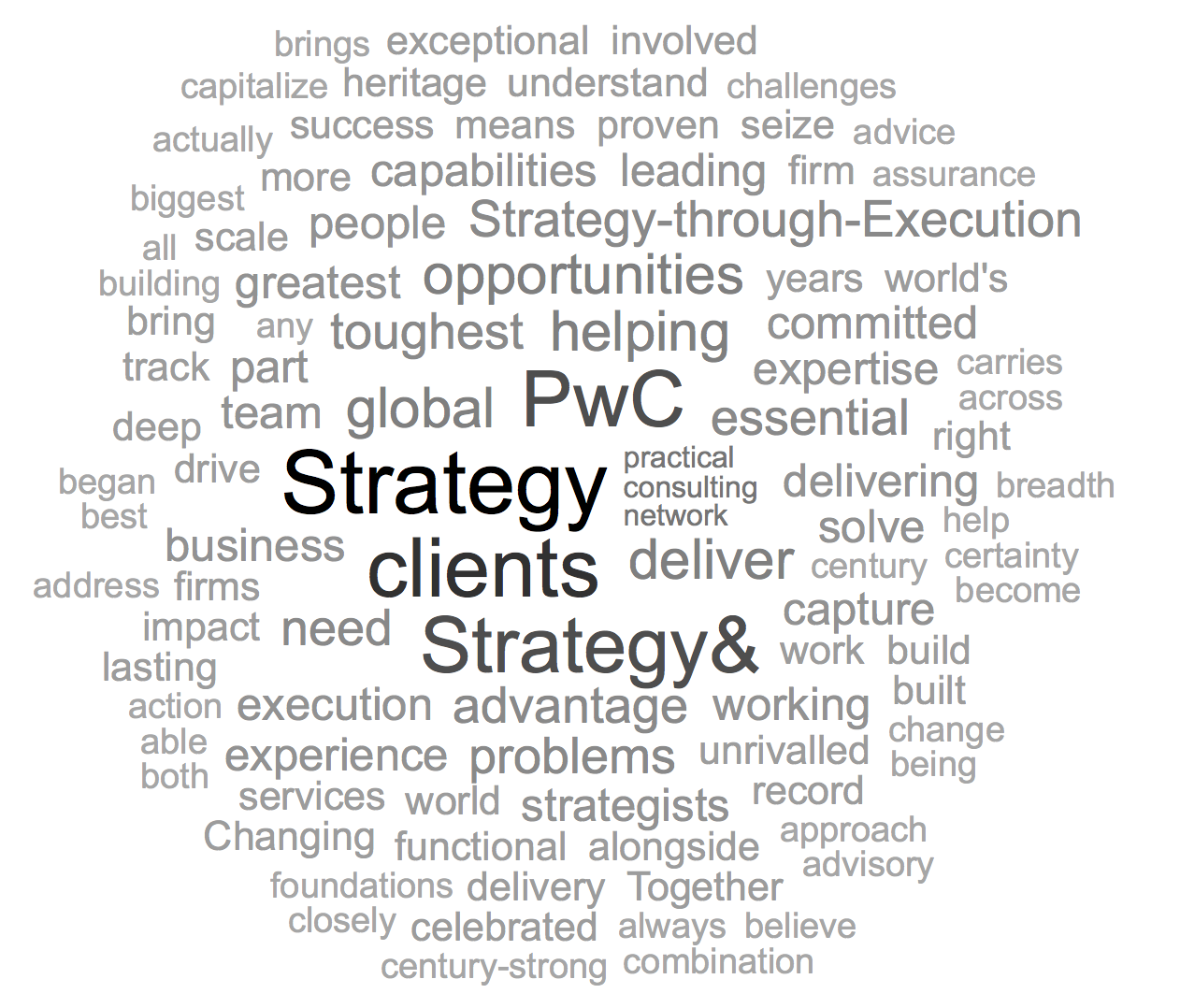
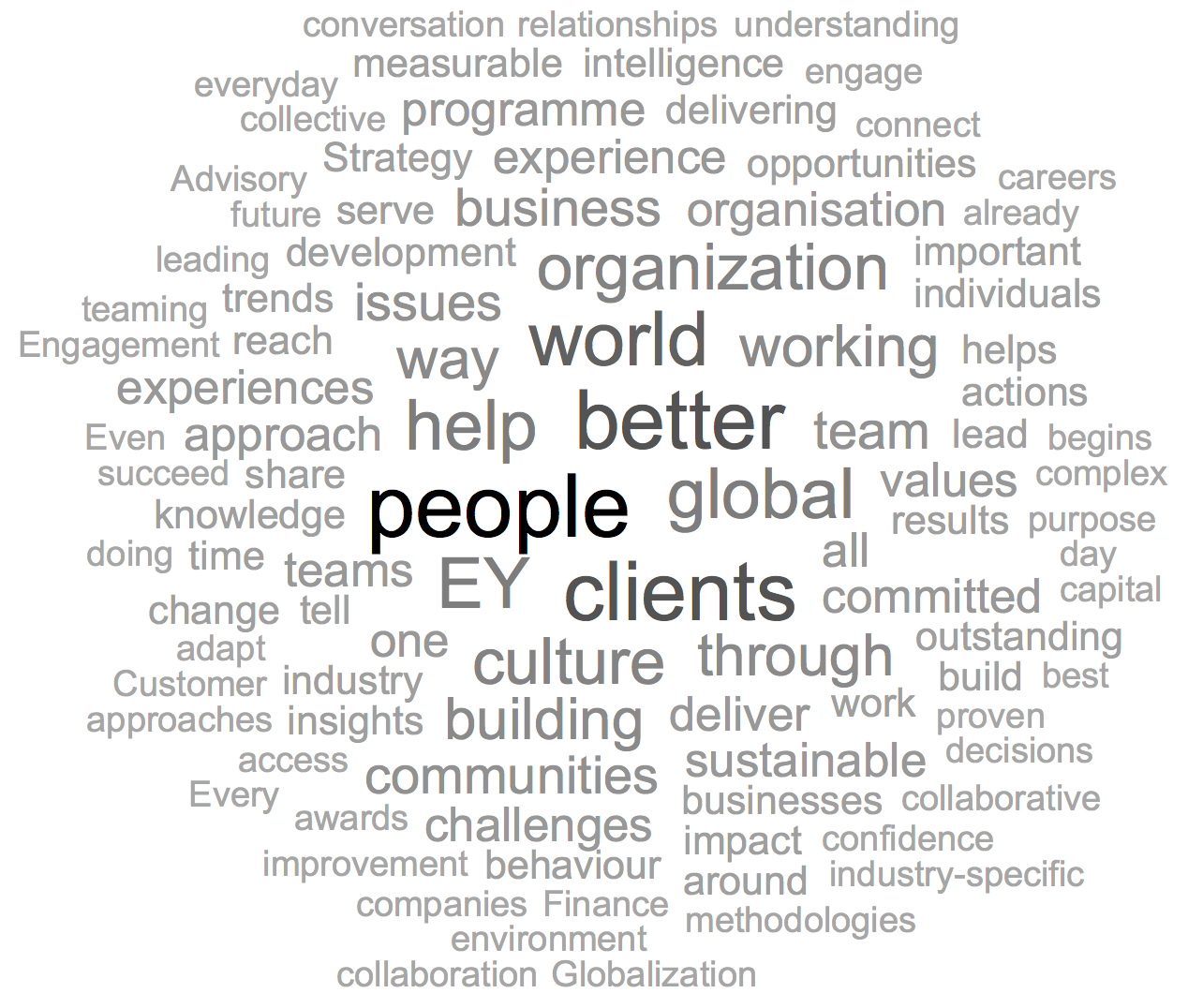
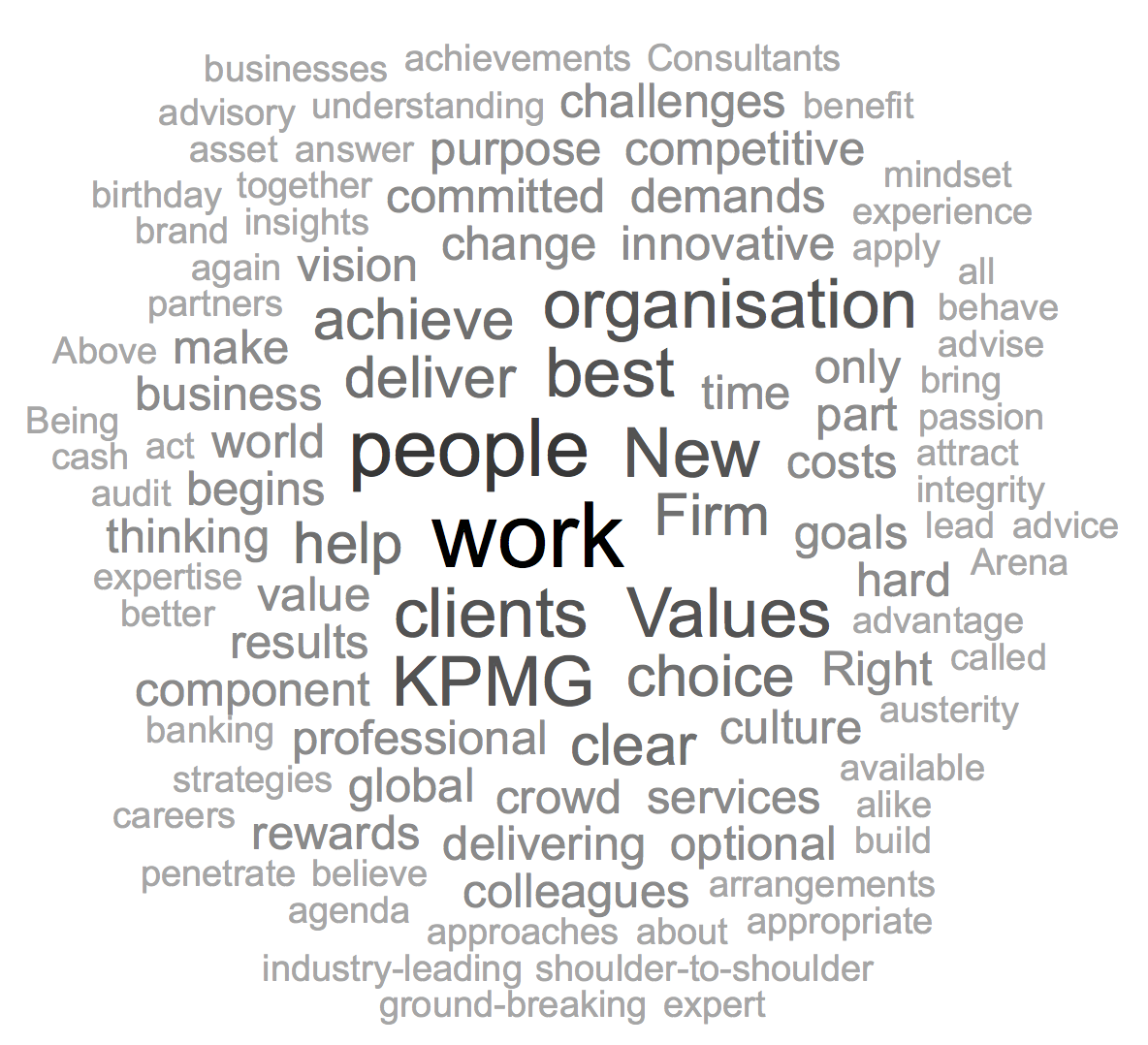
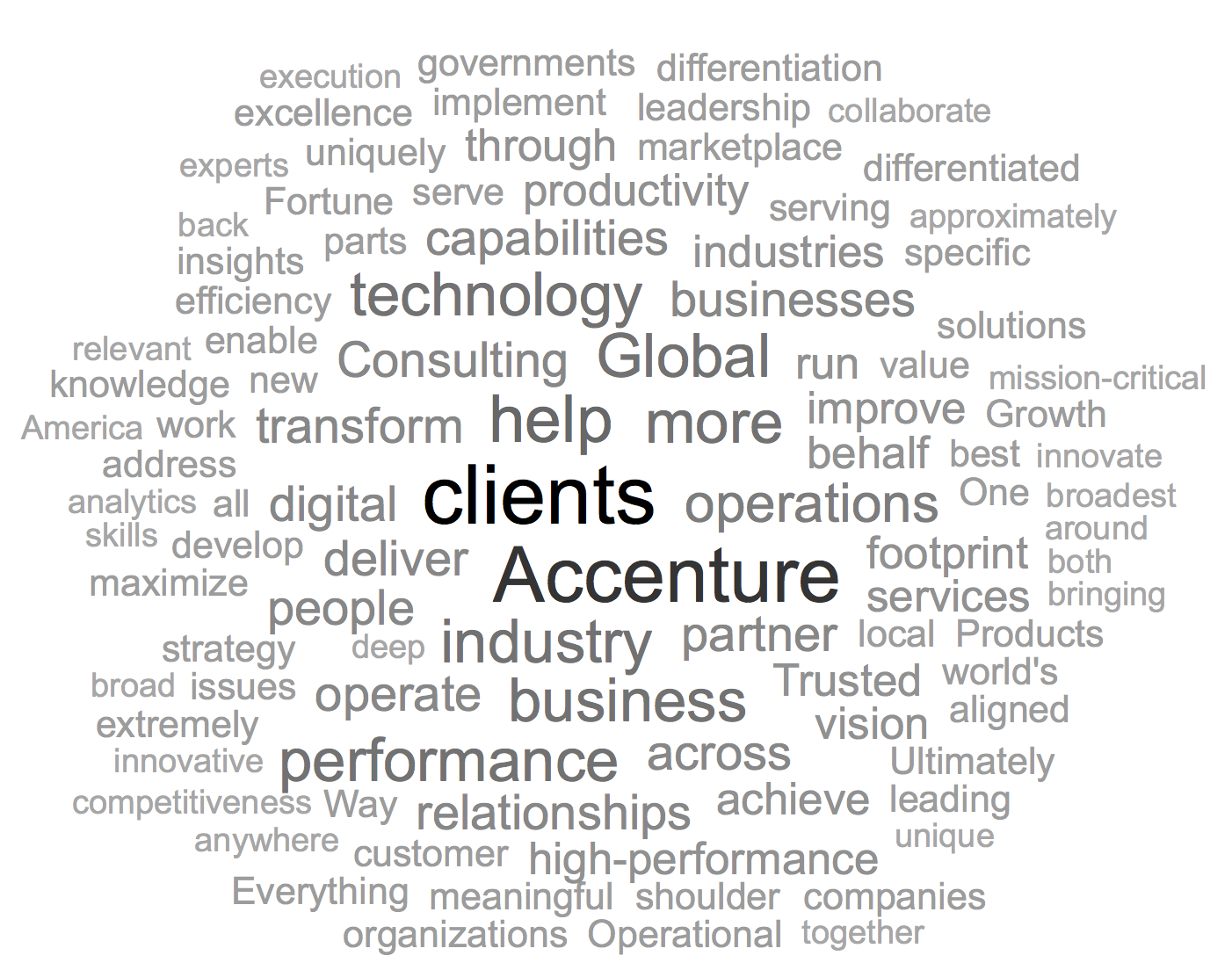
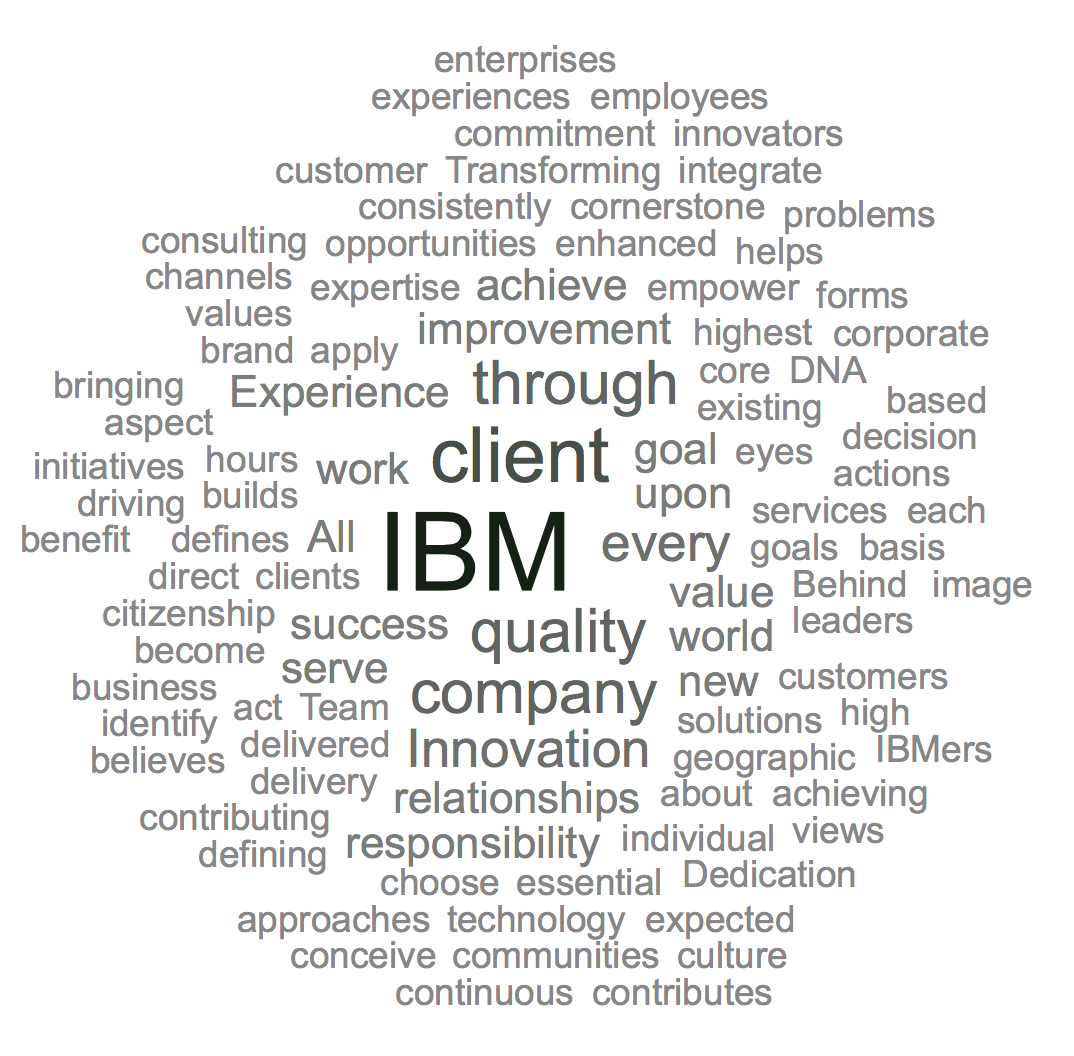
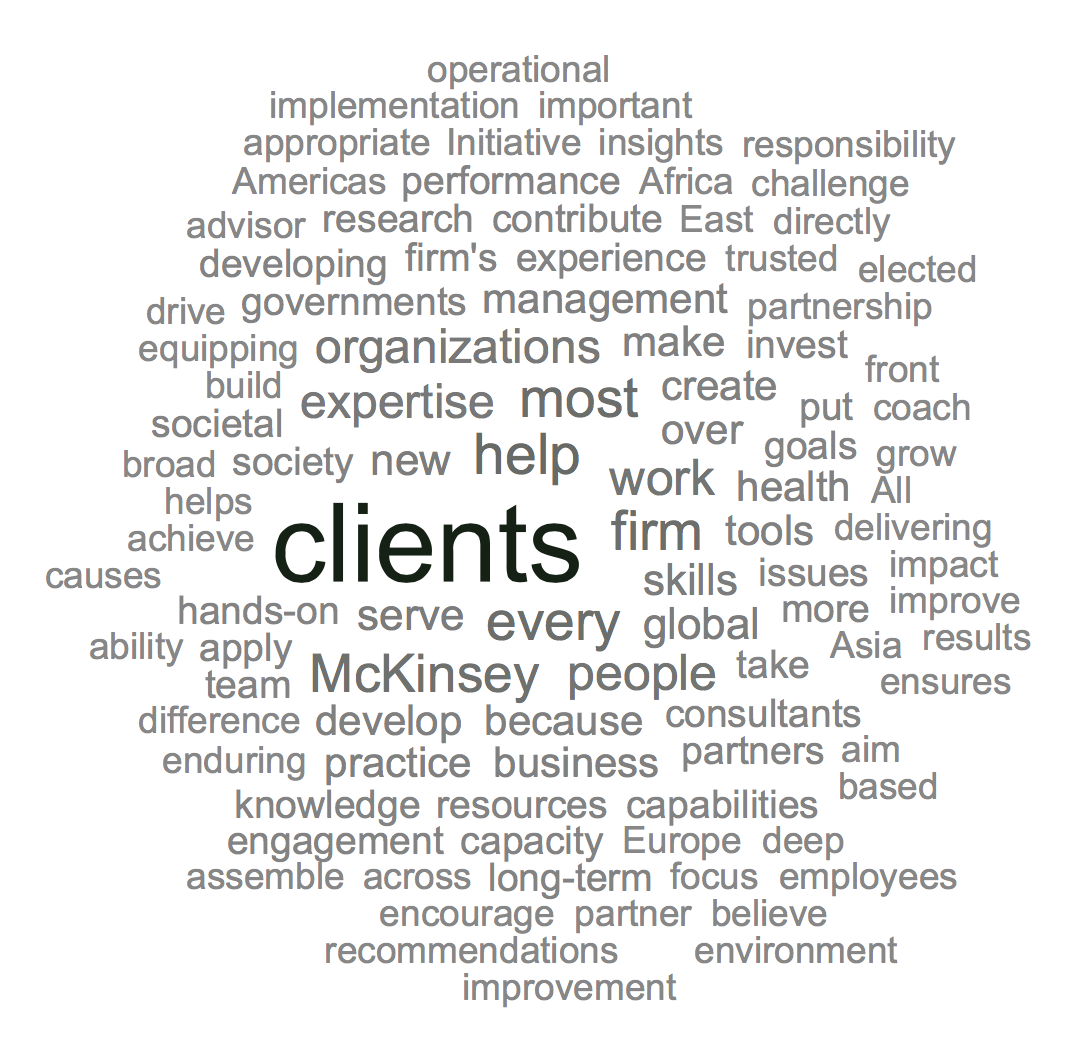
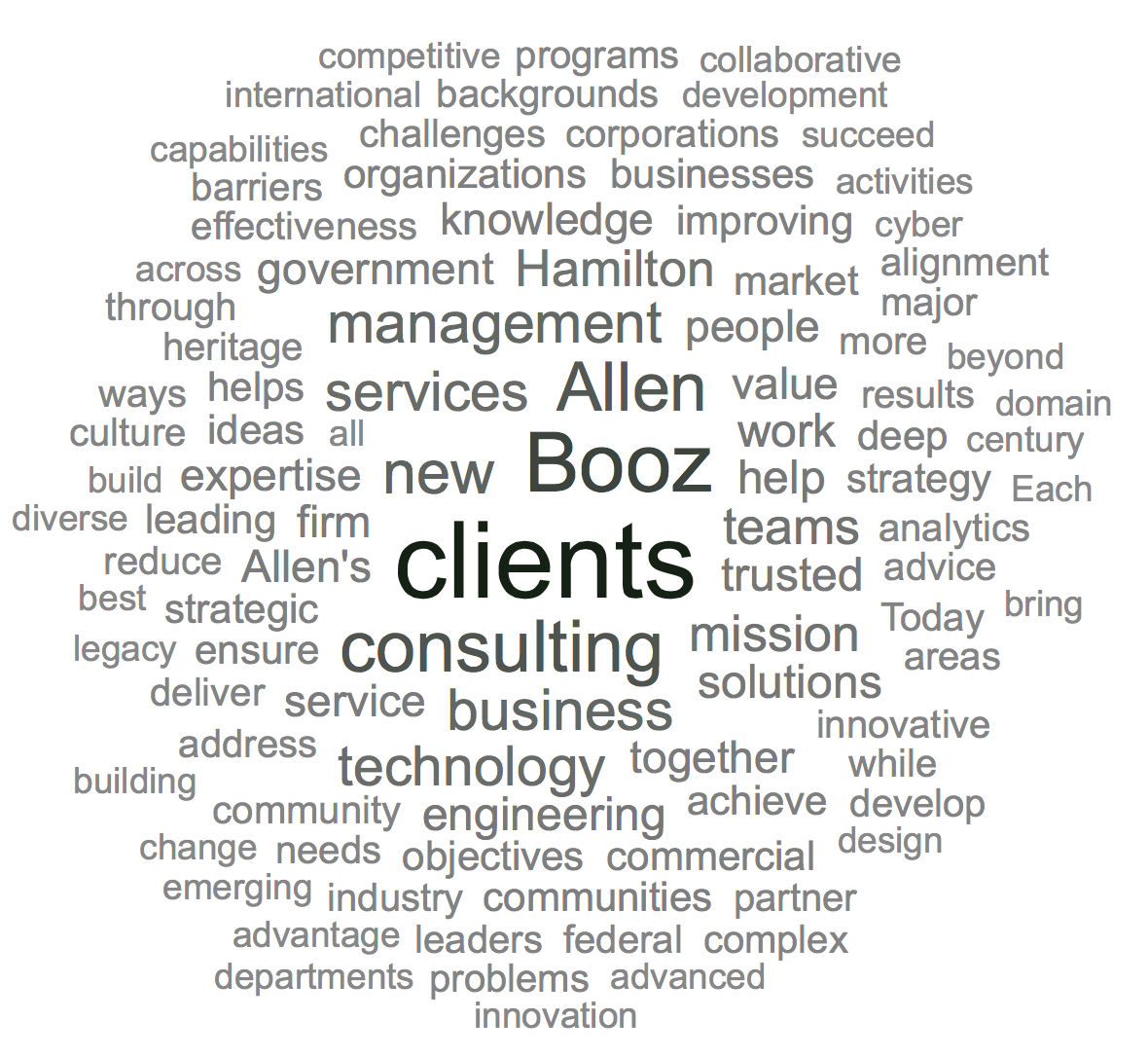
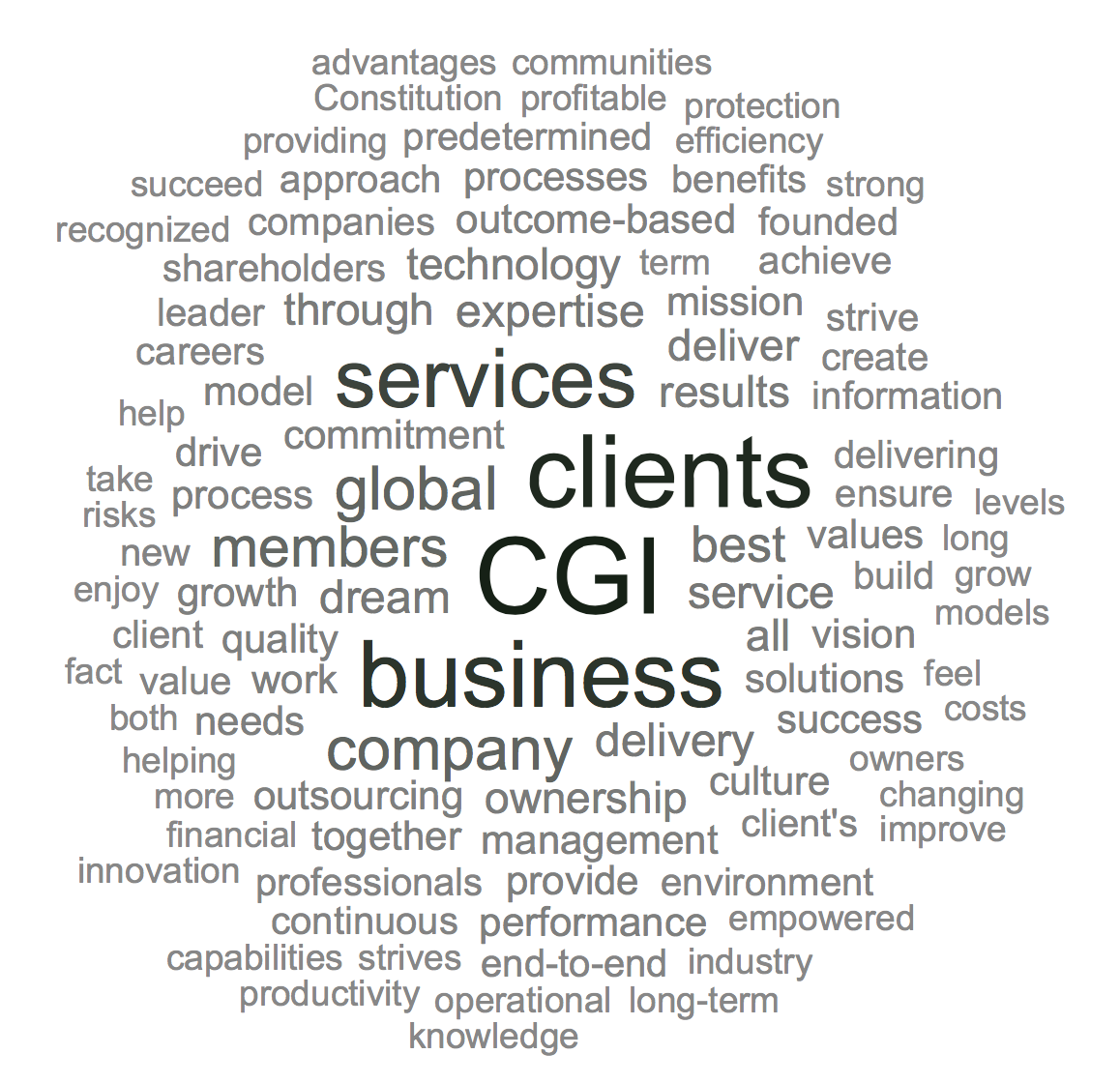
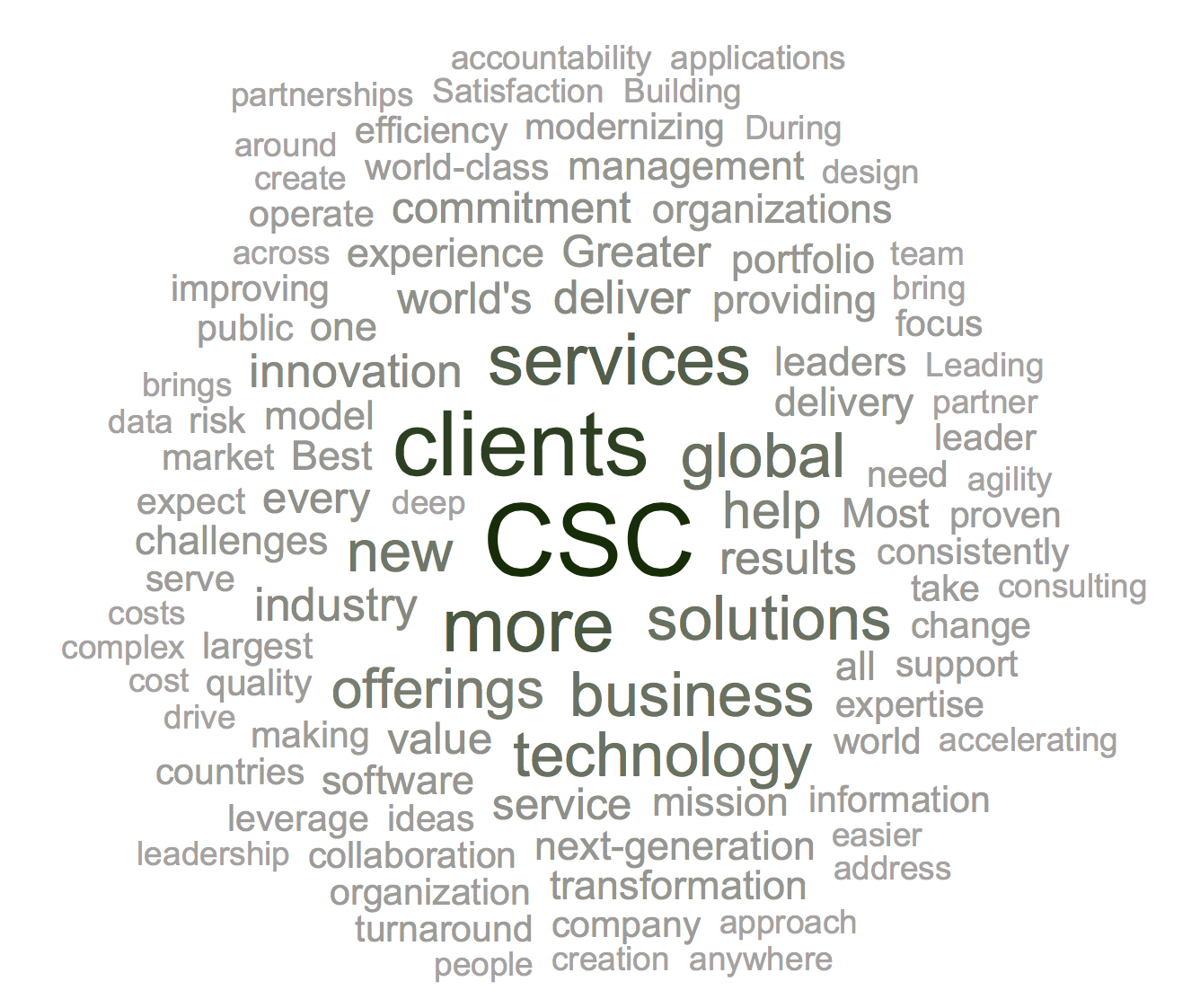
It is striking at first glance how similar these global consulting firms look. In fact, if brand names were removed, it would be nearly impossible to distinguish one firm from another…
The key question for professional services firms is therefore: if cognitive biases and market dynamics mean you have to appear to be ‘all things to all people’ to meet clients’ expectations and yet not too specialist to avoid being discounted, how do you differentiate your firm from the competition without fear of being deselected?!
It all comes down to behaviours:
The way your employees act in the critical moments of truth once the client or prospect has chosen to engage. It is how you illustrate that, in contrast to other firms, you could create real, tangible value for the client.
It is very rare that a client will choose one firm over another based on a website. However, should the behaviours of a firm’s employees (especially during business development activities and client engagements) match the uninspired and oft-repeated stock phrases found on the firm’s website, then there could be significant repercussions for the firm, particularly with regards to winning new business and maintaining client relationships.
Unfortunately our experience suggests that the monotony and similarity firms portray ‘online’ is often matched by risk-averse, hesitant behaviours during face-to-face interactions.
Not being too specific, offering many service options and using expected stock phrases might be important to stop your firm being deselected in initial touch points (such as the website) but equally, continuing to adopt a cautious approach will also stop you from being selected.
What ‘behaviours’ will help to differentiate your firm?
One clear example of a behaviour that can be used in business development to differentiate one firm from another is to offer the client a unique point of view or perspective it may not have heard from your competitors.
Many advisors feel uncomfortable ‘going out on a limb’ with clients and so stick to saying exactly what they think the client wants to hear. However, to repeat ourselves, such an on-going homage to the status quo simply merges every firm’s offering into another.
It is entirely possible to offer a new perspective and stand out from the crowd in an initial interaction without fear of being deselected as long as you have earned the right to do so. This is done by engaging with the client, listening to their needs, asking expert questions, understanding the client’s context and framing the situation.
There are some other core behaviours that will always differentiate your professional services firm. Many of these behaviours are not innate and must be learned, practised and refined:
- Listening and asking effective questions to gain a true understanding of the client’s situation
- Generating a unique point of view that adds real insight and a new perspective
- Developing a personal status and presence that creates true impact
- Thinking critically and solving complex problems
- Managing critical conversations and interactions effectively
- Recognising the decision making style of the client – their motivators and emotional drivers
- Building mutual respect, trust and interest
- Illustrating expertise, knowledge and specialisation without overtly bragging
- Genuinely collaborating – not simply providing an off-the-shelf product
- Demonstrating sound decision making and judgment
- Managing conflict and differences of opinion
- Being unique, remarkable and not afraid to offer an alternative to the status quo
The key to success for psychics, fortune-tellers, mediums and illusionists is to appeal to enough cognitive biases without being specific enough to be deselected.
As we have seen, market dynamics and cognitive biases mean it is understandable that firms who want to win as many engagements as possible continue to use websites that indulge these biases by using expected stock phrases and offering services that make them all things to all people.
Truly differentiating your firm from others comes down to how you behave in critical interactions and ‘moments of truth’; how you make a positive impression at every touch point (from support staff through to partner/director level) and how you demonstrate, using a unique point of view, that you can think critically and will bring real value to the relationship.
Being generic and saying the right things might mean you are not deselected in the first encounters but eventually your clients will need to see something different and compelling. It comes down to learning and honing critical professional services behaviours.
Being unique, taking a risk and standing out from the crowd in the way you behave might be more difficult and create a perceived risk but you stand a far better chance both of being believed and being selected.
The successful firms know they can’t always be all things to all people if they want to win new client engagements and maintain long term relationships – and they don’t need a psychic to tell them that.
Footnotes
[1] The top 10 global consulting firms were taken from Gartner research here. Our analysis reviewed the common ‘About Us’ pages found on most professional services websites. We analysed typical pages such as ‘about us’, ‘who we are’, ‘our values’, ‘our mission’, ‘why choose us’, ‘what makes us different’ etc.



